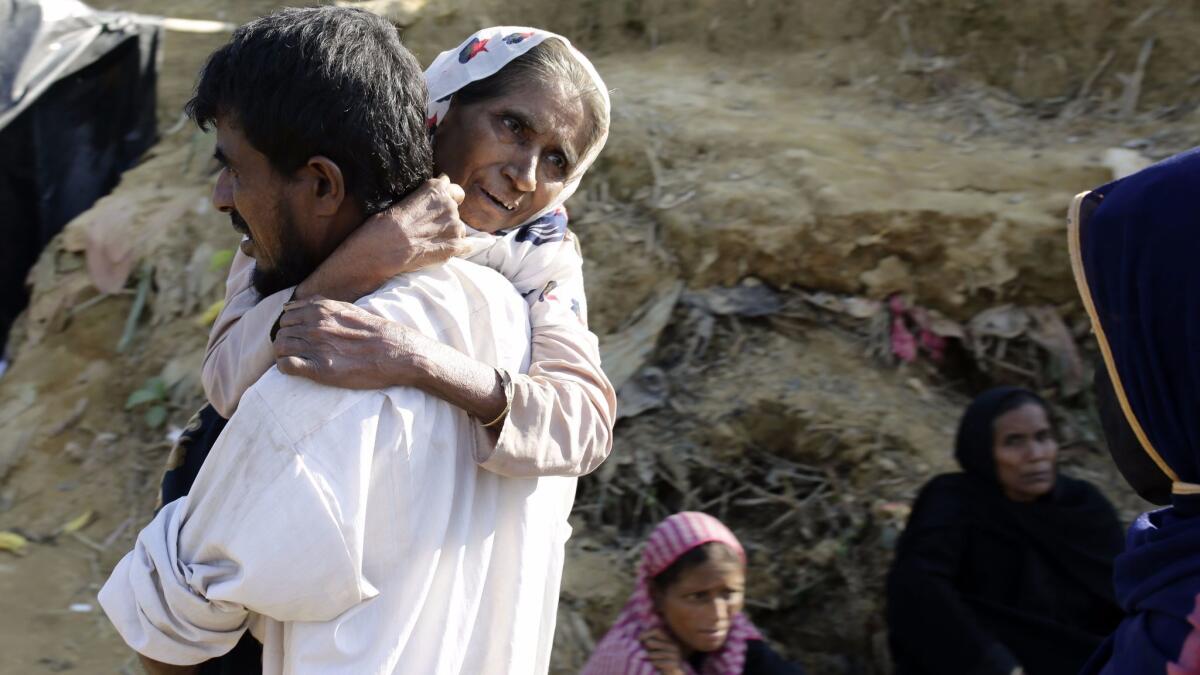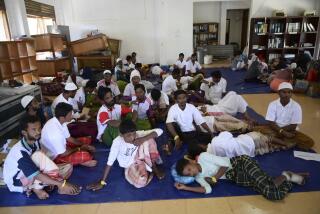Editorial: How much longer will the world sit by and watch crimes against humanity in Myanmar?

As the humanitarian crisis in Myanmar grows more grim, it shows every sign of taking its place on the shameful list of mass atrocities that the world did nothing to stop.
Since August, the Myanmar government has systematically engaged in what the United Nations, human rights groups and (finally) the U.S. State Department have called atrocities against its long persecuted Rohingya Muslim minority. The U.N. and U.S. Secretary of State Rex Tillerson have gone so far as to call it ethnic cleansing.
According to accounts from numerous survivors, government forces and their supporters have raped, killed, set people on fire and pillaged villages, causing the mass exodus of more than 600,000 Rohingya — mainly to refugee camps in neighboring Bangladesh. That’s about half the Rohingya population of Myanmar. Evidence of Rohingya villages being burned has been there for all to see, via satellite image analysis provided by Human Rights Watch.
The world always collectively reacts to crimes against humanity with the same horror and vows to never let them happen again. And then it breaks that vow.
How much more savage do people have to be before the global community outside Myanmar is moved to act?
For decades, the Rohingya have lived as a stateless, disenfranchised, persecuted minority in Buddhist majority Myanmar (also known as Burma). Even as the country dramatically progressed from a military government to a fragile proto-democracy, nothing has improved for the Rohingya, who can trace their roots in Myanmar back for generations but have still been shunned as interlopers. About 120,000 live in squalid displacement camps in the Rakhine state. The latest violence ostensibly started as a government response to Rohingya militant attacks on military outposts in late August, but it has far surpassed an effort just to put down militants.
No entreaties over the years to Myanmar’s government, including its de facto civilian leader Aung San Suu Kyi, appear to have made a difference. Like other leaders in Myanmar who don’t recognize the Rohingya as a separate ethnic group, Suu Kyi will neither utter the word “Rohingya” nor countenance people using it in her presence. She ordered a study of the troubles in Rakhine, where most Rohingya live, by a commission led by former U.N. Secretary-General Kofi Annan. His report — which calls on the government to recognize the Rohingya’s rights — appears to have been ignored. Harsh criticism from human rights groups and her fellow Nobel Prize laureates has failed to move Suu Kyi, who remained resolute during a visit this week by Pope Francis. (Disappointingly, he also did not mention the Rohingya by name.) The leader of the military told the pope that there is no religious discrimination in Myanmar — as if brutality against a Muslim ethnic group didn’t count.
Any global effort to intervene in Myanmar would be complicated by issues of sovereignty, trade relations and geopolitics — in particular, the rivalry between the U.S. and China for influence in Myanmar. But in the aftermath of crimes against humanity across the globe since the last century, the world has always collectively reacted with the same horror and vowed to never let it happen again. And then it breaks that vow.
In the late 20th century, the major powers failed to halt the genocides in Cambodia and Rwanda, and their intervention in Bosnia-Herzegovina didn’t stop Serbs there from massacring thousands of Muslims. Early this century, the world did little as 100,000 people were slaughtered in Darfur, Sudan. In 2005, the U.N. adopted a promising doctrine called the “responsibility to protect,” which held that the international community had a duty to intervene — with diplomacy or, if necessary, “collective action”— to protect populations against atrocities if their own governments will not. But the world failed on that as well in Syria.
Clearly, hatred of the Rohingya in Myanmar is so entrenched, from the citizenry up to the military leadership and Suu Kyi, that only outside intervention may be sufficient to stop the government from wiping out the Rohingya minority. At the very least, the U.S. should restore the economic sanctions it only recently lifted. There are other measures that the U.N. Security Council can and should impose short of military intervention, such as global economic sanctions and an international arms embargo. The government of Myanmar needs to be shown that, this time, the world will not sit idly by as another country tries to ethnically cleanse its population.
Follow the Opinion section on Twitter @latimesopinion or Facebook
More to Read
A cure for the common opinion
Get thought-provoking perspectives with our weekly newsletter.
You may occasionally receive promotional content from the Los Angeles Times.










